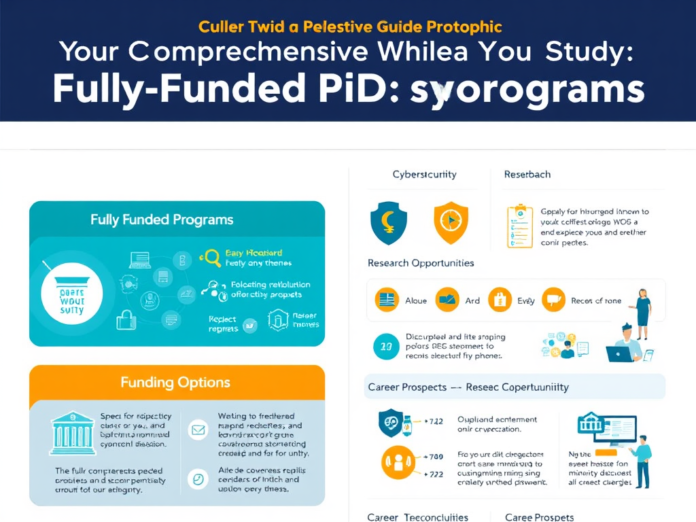The need for highly trained professionals is at an all-time high as cyber threats increase globally, and the need for innovative security solutions grows. A Phd in cybersecurity can open doors to leadership roles in business, academic employment, or high-quality research positions. Even better! You can do it completely supported. This all-inclusive guide analyses the most sought-after fully funded cybersecurity Phd programs, discusses their offerings, and provides professional advice for admission success.

In a PhD program, what does “fully funded” mean?
A fully funded PhD program usually covers:
- Complete tuition and costs
- A yearly stipend between $20,000 and $40,000+
- Medical coverage
- Possible research and travel grants
Usually, funding comes from:
- Research Assistantships (RA)
- Teaching Assistantships (TA)
- Grants and fellowships
- Outside scholarships—e.g., NSF, Dod, or NSA
These initiatives allow students to focus on significant research without accumulating debt.
Best Fully Funded Cybersecurity PhD Programs
Among the top universities providing completely financed PhD prospects in cybersecurity are:
Carnegie Mellon University – CyLab (Pittsburgh, PA)
- Program: PhD in Electrical and Computer Engineering or Societal Computing
- Funding: $35,000+ stipend and complete tuition RA/TA
- Main points: CyLab access, NSA/DHS CAE-R designation, industry-sponsored initiatives
- Discover more
University of California, Berkeley – EECS Department
- Program: PhD in Electrical Engineering and Computer Sciences
- Funding: RA/TA plus NSF, DOE, or DARPA fellowships
- Emphasis: Formal techniques, cryptography, privacy, network security
- Discover more
Georgia Institute of Technology
- Program: PhD in Computer Science or Cybersecurity
- Funding: NSA-designated CAE-R funds and research assistantships
- Research Labs: GTRI, GT Cybersecurity
University of Maryland – Maryland Cybersecurity Centre (MC2)
- Program: PhD in Computer Science or Engineering
- Funding: RA/TA funding; choices for NSA and Dod scholarships
- Emphasis Areas: Malware detection, artificial intelligence in cybersecurity, formal techniques
- Discover more
Purdue University – CERIAS
- Program: PhD in Computer Science or Information Security
- Funding: DOE and NSF chances with TA/RA
- Known For: CERIAS – Centre for Education and Research in Information Assurance and Security
- Discover more
Fully Funded International Options
University of Oxford – Centre for Doctoral Training in Cyber Security
- Program: DPhil in Cyber Security
- Funding: Full UKRI + EPSRC scholarships for UK and overseas students.
- Emphasis: Human elements, safe systems, legislation, and cryptography
- Discover more
ETH Zurich
- Funding: Generous Swiss stipends; Research Assistant pay
- Especially for: Innovative laboratories and research freedom
- Find out more
Advice on Admissions: Getting Into a Fully Funded Cybersecurity PhD
Admission to a top Phd program in cybersecurity is highly competitive. Here is how to increase your possibilities:
- Good Academic Background
- Often, a master’s degree is desirable, but not necessarily necessary.
- Good GPA and records in CS, ECE, or a similar discipline.
- Appropriate Research Experience
- Write articles, support open-source projects, and participate in laboratories.
- Demonstrate technical writing and problem-solving abilities.
- Interesting Statement of Purpose
- Match academics with research interests.
- Share enthusiasm, professional aspirations, and research aims.
- Recommendations in Writing
- Get recommendations from leading industry professionals or university scholars.
- Optional Standardised Tests
- While some have waived it, others still call for the RE.
- Fellowships and Scholarships
- For overseas students, consider applying for the Fulbright, SMART, NDSEG, or NSF GRFP.
Practical Uses: Jobs Following a Cybersecurity PhD
A PhD in cybersecurity can open opportunities in several fields:
- Academic: Postdoctoral fellow or tenure-track professor
- Research Labs: Lawrence Livermore, Sandia, SRI, MITRE
- Government: FBI cyber task teams, Dod, DHS, NSA
- Private Sector: IBM, Palantir, Cisco, Microsoft, Google
- Entrepreneurship: Startups in blockchain security, zero-trust systems, threat detection
In research positions, Phd graduates often earn six-figure salaries.
Links Internal and Outbound
- Internal Links: Cool Cybersecurity System Names, Cybersecurity for Increased Connectivity
- Outside Links: NSA Centres of Academic Excellence, NSF GRFP, Carnegie Mellon CyLab, CyberCorps Scholarship for Service
READ MORE – Elba Raises $2.5M to Revolutionise Cybersecurity with Netflix-Inspired Tech
FAQs:
- Is every cybersecurity Phd program fully funded?
- Many elite programs provide complete funding via fellowships or assistantships; not all do. Always visit the department’s website.
- Must I have a master’s degree to apply?
- Not always the case. Some schools take outstanding individuals straight from a bachelor’s degree.
- How long is a PhD in cybersecurity?
- Usually 4 to 6 years, depending on the progress of research and publishing criteria.
- May overseas students find completely sponsored jobs?
- Absolutely. Many outside organisations, such as the Commonwealth and Fulbright, as well as universities, help international PhD candidates.
- How much does a cybersecurity PhD student typically get?
- Usually, it falls between $25,000 and $40,000 per year, depending on the curriculum and area.
Conclusion:
If you want to lead in research, policy, or high-level technical innovation, pursuing a fully financed PhD in cybersecurity is a wise decision. Phd graduates are essential to protecting our digital future, given that global challenges are constantly evolving.
You can advance your career with a lighter financial load by carefully choosing the right curriculum, demonstrating research promise, and aligning with business requirements.
Prepared to use? Investigate program connections, speak with advisors, and begin your PhD path in cybersecurity.



